
OR
Nepal Republic Media's Meet and Greet with Advertising Agencies
Media and ad agencies must collaborate to foster growth of advertising market
Published On: August 18, 2023 04:56 PM NPT By: Republica | @RepublicaNepal
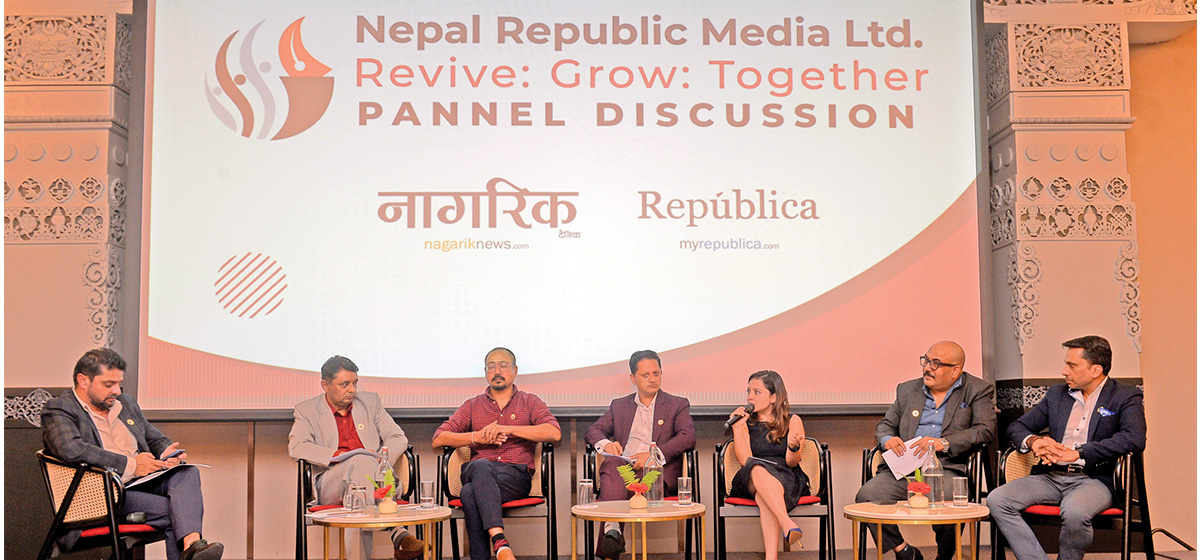
The speakers of the 'Revive and Grow Together' interactive program, hosted by Nepal Republic Media on Wednesday, shared a unanimous perspective on the imperative collaboration between the media and advertising agencies. They underscored the undeniable necessity of such a partnership to foster the expansion of the advertising market, a sentiment echoed by all speakers at the event. Similarly, the speakers voiced a compelling notion regarding Nepal Republic Media's transition into a public company. They expressed the firm conviction that this transformation would ensure the perpetual direct ownership of the media by the people. Summarizing the perspectives shared during the interactive program, the following edited excerpts encapsulate the essence of the speakers' viewpoints:
We have given priority to the voice of the people
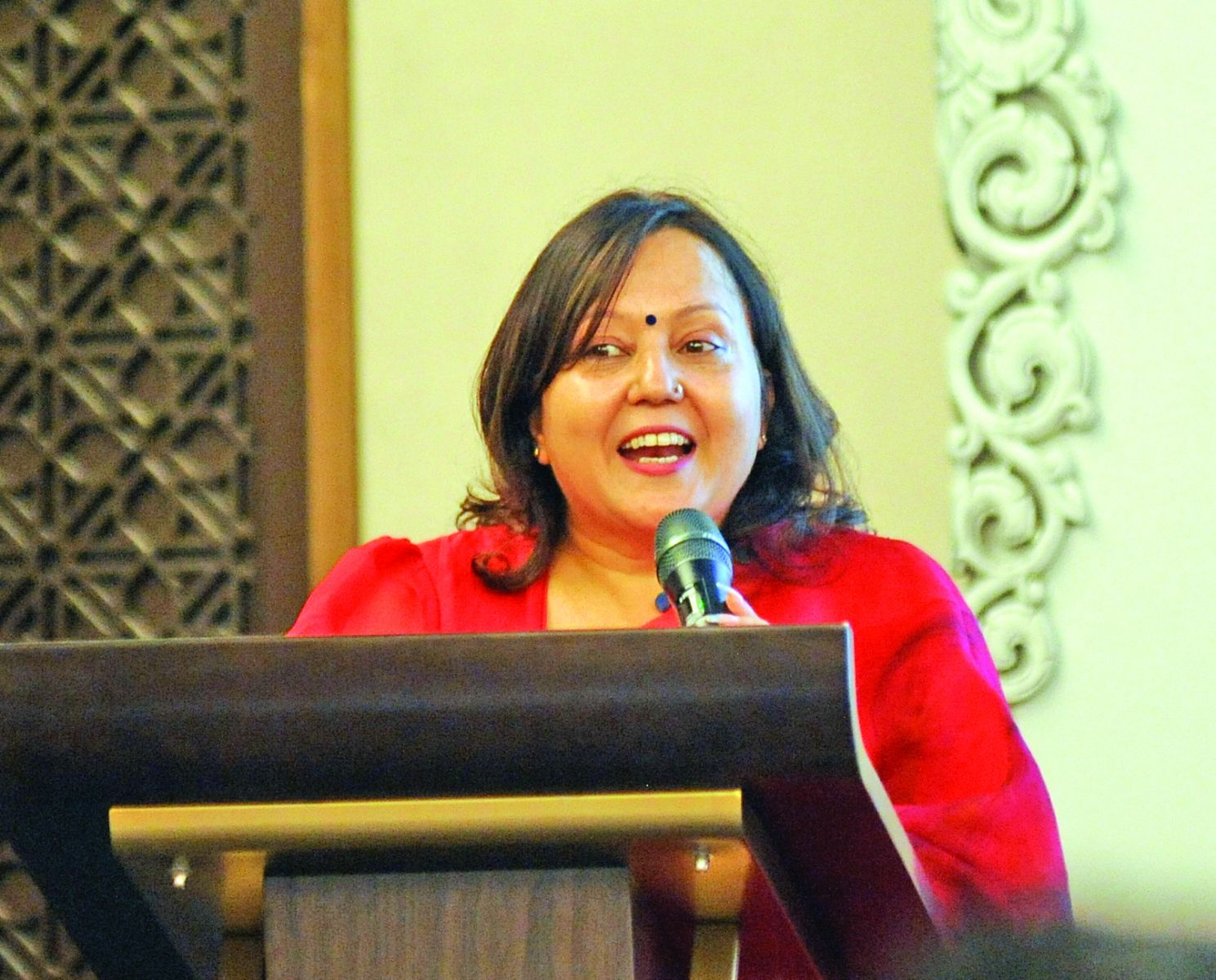
Shova Gyawali, Director, Nepal Republic Media
A collaboration between the media and the advertising agencies is imperative for mutual advancement. Both have no choice but to cooperate and move forward. The transition of Nepal Republic Media into a public company holds significant implications, amplifying direct ownership and public accessibility to media resources.
There was not even a single public media company in the country until recently; we have become one after years of our efforts. This is a matter of excitement not only for us but also for all media. The evolution of a mainstream media into a public company serves as a beacon of renewed optimism for the industry, offering a fresh perspective and renewed potential. In this pursuit, both media and advertising agencies must join forces, synergizing their efforts to fortify and elevate the media landscape.
The media's role in amplifying the citizens’ voice is of utmost importance. It serves as a platform for marginalized perspectives across various strata, regions, and communities. In alignment with this ethos, Nepal Republic Media has diligently championed the cause of ordinary citizens, prioritizing their narratives. The journey towards transforming Nepal Republic Media into a public company has been a laborious yet fulfilling endeavor. This transition has bestowed upon Nepal Republic Media a pioneering status in the annals of media history.
Presently, both media and agencies grapple with challenges. To surmount these challenges, a collaborative approach is necessary. The transition of Nepal Republic Media into a public company not only holds promise for a diverse audience but also symbolizes a gratifying venture. This transformation presents an exciting avenue, fraught with possibilities. The status of a public company augments Nepal Republic Media's capacity to spotlight issues pertinent to the common people. In turn, this expanded coverage holds the potential to catalyze the nation's growth and progress.
Print is the most reliable medium of communication

Sambridhi Gyawali, CEO, Nepal Republic Media Limited
In a democracy, the media acts independently and is watched over by its readers and consumers. Nepal Republic Media is like an open book when it comes to showing how it creates and shares news, sells and delivers it, and handles money. While the small media are impacting advertising, bigger media struggle to find advertisements.
Print media, like newspapers, is a trustworthy source of information. People still believe in Nepal Republic Media because it is honest and dependable.
These are tough days for the media. Advertisers need to know which media sources are trustworthy. We're working together with advertising groups to move forward.
Advertising agencies also need to show their customers which media works best. They should be honest and reliable too. They must understand what consumers want and act on that. The first step is to know which media sources are true and trustworthy.
Big media has faced challenges after the COVID-19 pandemic due to high costs. Advertising is crucial for products. People buy things because of ads. Agencies should choose accurate and credible media for advertising. Even though the digital media is popular now, the mainstream media remains credible.
Social media and digital platforms try to get attention, but the mainstream media is still trustworthy. The print media, such as newspapers, is still powerful for spreading the word about products.
Advertisement Board cannot accept a contraction in the advertising market
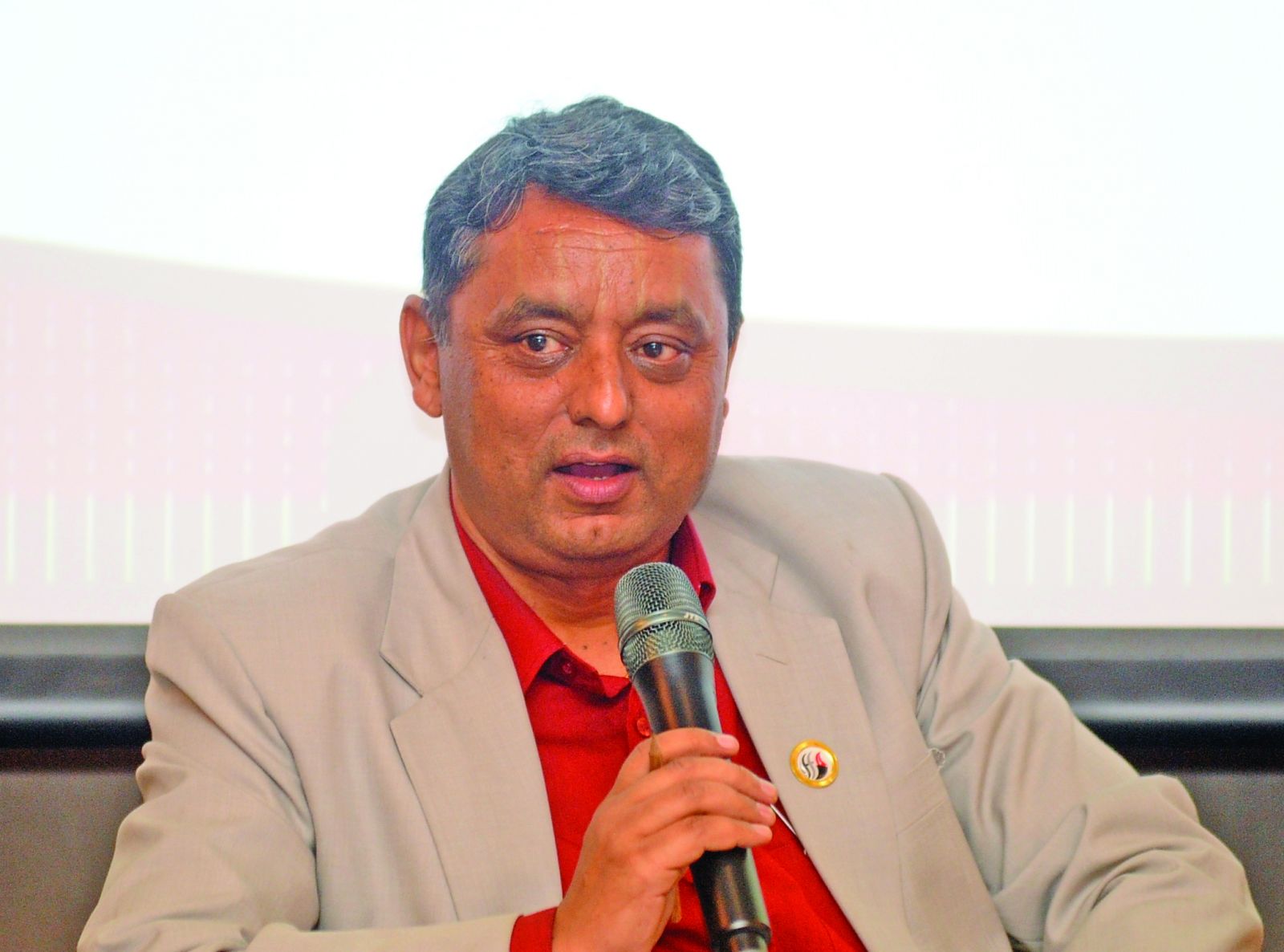
Laxman Humagain, Chairman, Advertisement Board
Advertisements are sourced from advertisers, making them the cornerstone of this industry. Advertising's foundation rests upon advertisers, encompassing not only agencies, clients, and media. Import volumes surpass local production within this sector.
Our ability to manage the advertising market has been inadequate. Our focus has been predominantly on producing ads for sale, neglecting effective market management and underemphasizing the promotion of product brands.
The media landscape in Nepal is remarkably extensive, a matter under scrutiny by the Advertisement Board. Media content remains largely unregulated, resulting in some media outlets struggling to attract business. Print media distribution also faces challenges. Encouragement of advertising is essential, with transparent post-advertisement accounting. An essential component is the implementation of a media rating system.
Nepal Republic Media has taken proactive steps by engaging in discussions with advertising agencies, achieving what the advertisement board could not. Such dialogues should encompass comprehensive considerations. Constricting the ad market is an unacceptable proposition for the advertisement board.
Adherence to government laws is imperative for every agency. The regulatory body's role has primarily been in regulation, with limited contribution to sectoral development and expansion. Cohesion among related organizations in advocating advertising policy seems lacking. There's a distinct absence of comprehensive discussions surrounding advertising. Policy coherence is vital for a robust advertising market. Both media and advertising agencies should ensure transparency in sales, pricing, billing, etc. Price adjustments extend beyond just agencies and also involve media outlets.
Both media and advertising agencies should be improved
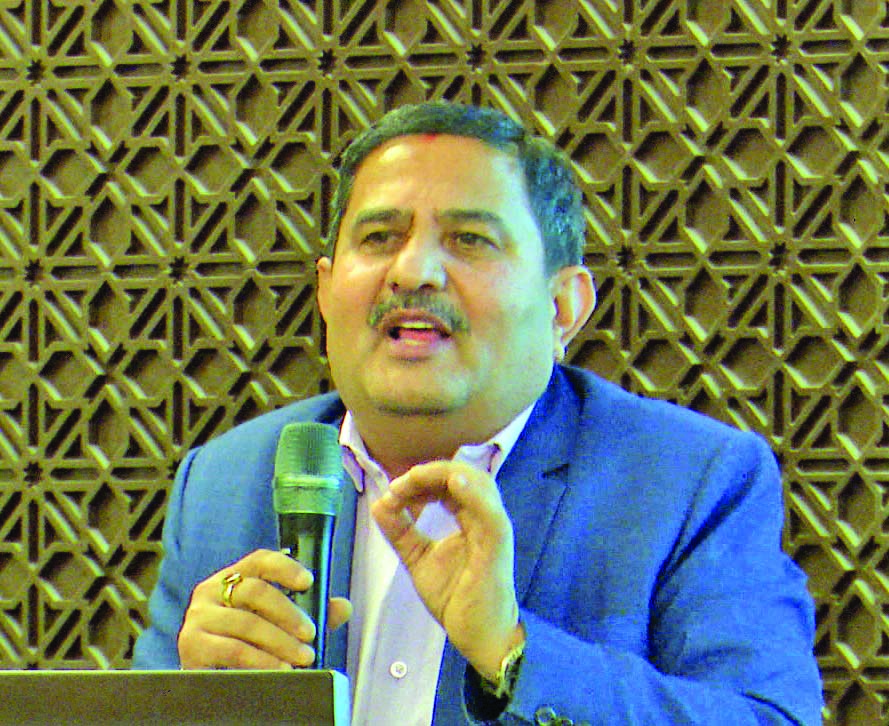
Som Prasad Dhital, Chairman, Advertising Association of Nepal
Nepal's advertising market currently grapples with several challenges, witnessing a higher prevalence of distortions and irregularities compared to the past. These issues arise from contributions by media owners, advertising agencies, and advertisers, collectively introducing such advertising discrepancies. Hence, the only viable solution is to collaborate and address these problems as a united front.
The problem is more within our own practices rather than solely with Nepali advertisers. We have inadvertently or directly compromised advertisers through bribery or other undue influences. It's imperative to rectify past mistakes and forge ahead.
A critical assessment is needed to determine the roles played by both media and advertising agencies in reducing newspaper advertisement rates from Rs 1,400 to Rs 1,500 per cc to just Rs 100 per cc. This distortion is a shared responsibility, as companies previously allocated budgets of Rs 4 to 5 million for advertisements. The current scenario, with ads now costing Rs 40,000 to Rs 50,000, prompts us to question the future of advertising in Nepal. While varying degrees of fault may be present, it's our collective duty to address and rectify this issue through our own endeavors.
The commendable transition of Nepal Republic Media into a public company signals progress. The advertising and communication sector requires activation. It's now essential for the leadership of the advertising board to take decisive action and reorganize the advertising market. We kindly request the facilitation of necessary steps toward this goal. Moreover, we urge the board to undertake initiatives aimed at effectively regulating the advertising market.
Media cannot sustain without advertising

Raju Dhungel, Managing Director, Impressions A Creative Design Pvt Ltd
The Bank, Finance and Insurance sector (BFI) has shown a favorable outlook towards the media industry. While BFI is open to engaging with media, the sheer multitude of media outlets can be overwhelming for them.
The current challenge arises from the extensive media landscape in the country. Deciding which media to choose and discerning its effectiveness is perplexing. The incessant phone calls from media houses are becoming burdensome. It's becoming increasingly difficult to distinguish between media options and determine their effectiveness and audience preference.
Recognizing the importance of advertising, BFI is willing to collaborate in this endeavor. However, there's a need for enhanced support for advertising efforts. While media houses heavily rely on advertisements, advertisers should ensure that their messages reach a broader audience. Trustworthy media outlets are sought after by advertisers and agencies.
The media industry requires better regulation. Despite BFIs (Bank, Finance, Insurance) formulating media plans, there's a lack of reliable data concerning the age groups, geographic locations, and timing of advertisement consumption.
Instances occur where advertisements are pulled due to inadequate data on target consumers. Precise information about which magazines or media outlets reach specific areas, the timing of exposure, and the impact on consumers is missing. Accurate consumer statistics need to be maintained by the media.
Advertising industry needs transparency

Sudip Thapa, Managing Director, ANS Creation Pvt Ltd
With a proliferation of media options in the country, the current challenge revolves around consumers' selection of media sources. The media industry's operation is intertwined with advertisers, and agencies serve as vital intermediaries, bridging the gap between them.
Agencies undertake the crucial task of determining the optimal placement of advertisements and selecting suitable media platforms. They foster connections between media outlets and advertisers while pinpointing target consumers.
Media entities should prioritize both the efficacy and credibility of their platforms. The placement of advertisements significantly influences consumer perceptions. Unfortunately, a standardized professional framework is lacking within the advertising industry. Its functioning oscillates between resembling banking and vending, and the agencies that oversee the advertising market often overlook the need for professional assurance in their work.
Given that the advertising industry hinges on human resources, it's imperative for individuals in media and advertising roles to possess skills and resourcefulness. Both organizations must consider resource sufficiency to enhance the efficiency of their workforce. To harness human potential, skills and resources must align. Price discrepancies between agencies and media further contribute to challenges, as uncertainty exists about appropriate charges for various consumers.
The media and the advertising agencies ought to establish a foundation and collaboratively progress. The agencies' role in selecting media sources is crucial, yet it often encounters classification issues due to challenges in explaining to advertisers. The bedrock should be the consumer and the brand itself, addressing the existing gap. The only viable approach is to advance collectively to bridge this gap.
New generation is perceiving advertisements differently

Kashyap Shakya, Managing Director, Pycus
The most important aspect is about understanding the consumer’s behavior and preferences. Consumer education is the most important need today in the contemporary advertising landscape. Today's consumers have a different understanding of advertising. Perhaps due to the generational change, the new generation views advertising differently.
A critical consideration arises when evaluating the credibility and authority of different media platforms. Particularly, if the mainstream media holds a more authoritative and credible position compared to other channels, effectively conveying this distinction to both advertising agencies and consumers is crucial. If you can't explain why you should advertise in mainstream media, then you can proceed by using digital and social media, which are now widely used. Effectiveness in advertising relies on ensuring visibility across media spaces.
No one can take the fixed position of any media but one must be able to explain to their consumers and agencies why one should advertise in that particular media.
There is a need to advertise even when sales are down

Deependra Tandon, Managing Director, Business Advantage
As we hear all the time, the advertising market is vulnerable during market downturns. All of us are realizing and assimilating this matter. The main backup of any company's brand and product is its sales.
When the market for any product or service declines, its direct impact is observed on the sales. During times when a company's sales decline, the overall business is definitely affected. Advertising plays a very important role in branding, promotion and marketing any product or service. Even in times of sales downturn, advertising/marketing plays an important role in increasing sales. The consumers today have a lot of options to choose from. Therefore, it is necessary for the advertiser to advertise in the right way.
It has become necessary to advertise your product properly only by maintaining a close relationship with the customer to communicate the value of goods and services. A company needs to maintain quality not only in advertising but also in its products. It is time to promote your company's products and services through the right media and style to enter the competitive market.
Advertisers should focus on building brands
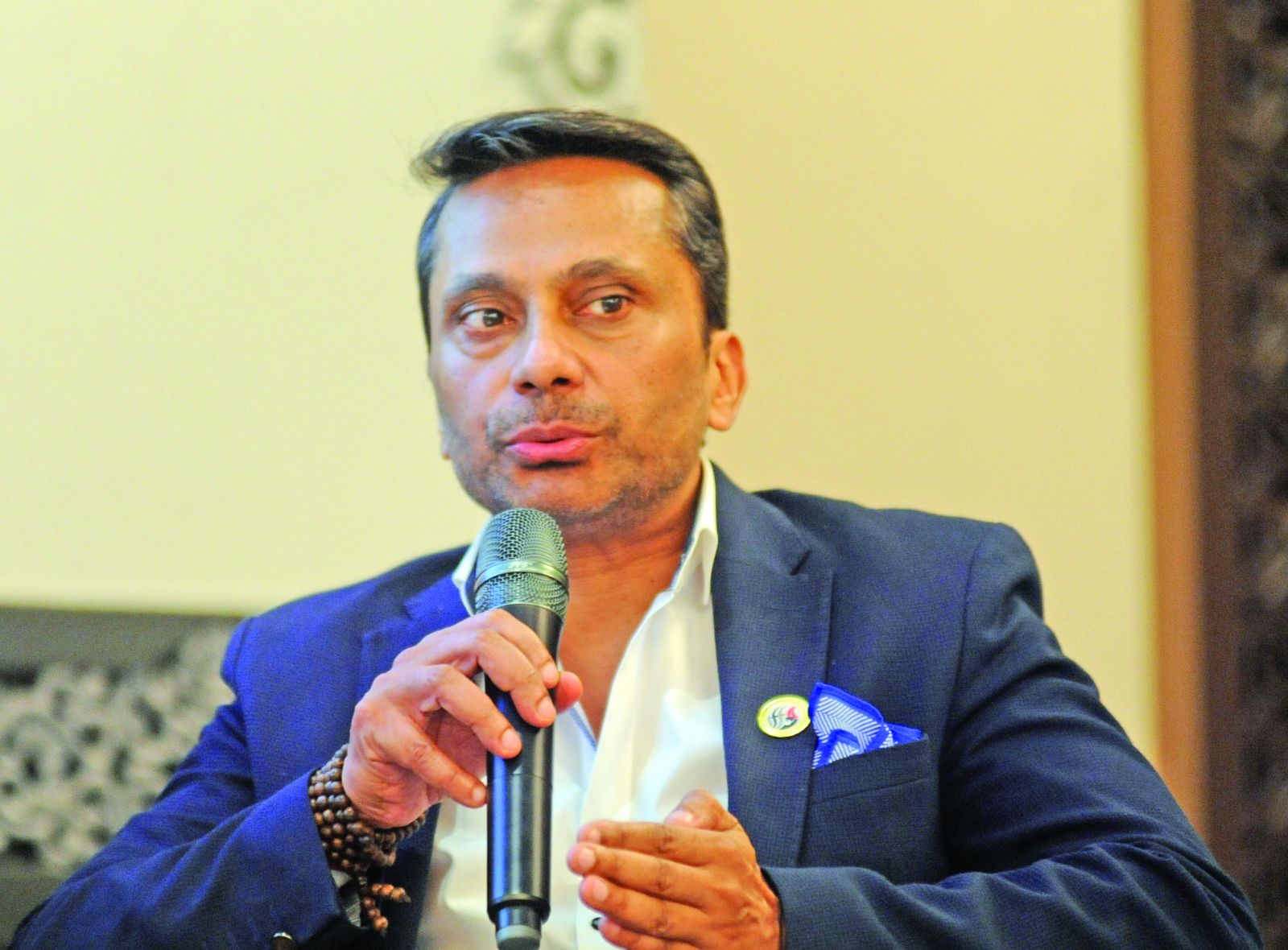
Ranjit Acharya, Chief Executive Officer, Prisma Advertising
There is a trend where agencies seem to be more focused on immediate sales than brand building. The focus of the advertising industry is on sales distribution, promotions and discounts and offers. But advertisers should focus first on brand building - something agencies are currently ignoring. Due to this, this industry has to face more challenges. Both the media outlets and the advertising agencies have to bear the brunt of this.
Now, prices and competition have reached low levels. At the same time, the market has not been that dynamic. At this time, the agencies should pay their attention towards branding rather than sales. These are challenging times for all of us, but with reduced costs and competition, as well as a relatively less dynamic market, we should shift our focus from sales to branding.
The industry is struggling to convince its customers about which media is reliable and effective. While we are advertising through various media outlets, we are also missing out on the credibility and influence of the media.
Our ability to persuade our clients regarding media reliability is lacking. It is now crucial for both media and agencies to explain this to the customer. The time has come to educate the customers about digital media and mainstream media. In such cases both the media and the agencies should convey this to their clients. There is a lack of research and data on ad users in Nepal.
In such a situation, the advertisers find themselves in a dilemma of choosing the appropriate media to advertise; it is not possible to make quality programs in the media without advertisements, and if there is no good program, it is not possible to reach the target group.
Despite the aggressive rise of digital media due to technological advancements, it's yet to attain the credibility held by the mainstream media. What the digital media cannot take away from the mainstream media is credibility.
Therefore, knowing its importance, it becomes vital for agencies and media to cooperate with each other to accurately identify their customers. There is a situation where advertisements are not able to reach the target group.
Although the influence of the digital media has progressed due to the development of science and technology, it has not yet achieved the credibility established by the mainstream media.
Due to the abundance of media in the country, it is difficult to determine which media to advertise in and how reliable it is. The problem has also arisen because there is widespread attraction towards the digital media over the mainstream media.
You May Like This
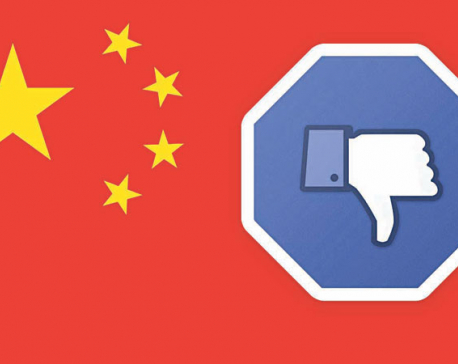
China limits online media to publish news sourced from social media
China’s internet regulator will launch a crackdown on the reporting of news gathered from social media, as part of what... Read More...

Infographics: Why women are the real power behind social media?
Why women are the real power behind social media? ... Read More...

Constructing public opinion via social media
Social media now has become an increasingly important part of our life. The awareness of using social media has moved... Read More...




Just In
- Sunkoshi-Marin Diversion Project’s tunnel construction nears completion, breakthrough scheduled for May 8
- Govt tightens security arrangement for Third Investment Summit 2024
- Pesticide residue found in vegetables in Nepalgunj
- Aam Janata Party and Samajwadi Jana Ekata Party merge
- 1,600 participants confirmed for Nepal Investment Summit
- Ilam-2 by-elections held peacefully, vote count likely to start tonight
- NEA schedules five-day power cut across Kathmandu Valley for underground cable installation
- Hundreds of passengers including foreign tourists in distress as poor visibility halts flights to and from PRIA







-1200x560-wm_20240427144118.jpg)



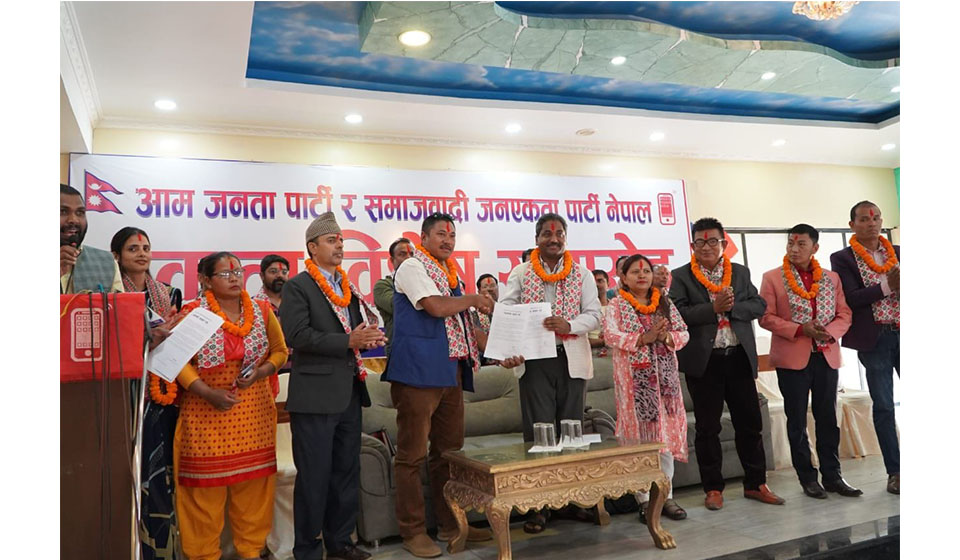

Leave A Comment